2023年中考英语语法专项复习课件——形容词副词(共64张PPT)
文档属性
| 名称 | 2023年中考英语语法专项复习课件——形容词副词(共64张PPT) |  | |
| 格式 | pptx | ||
| 文件大小 | 7.2MB | ||
| 资源类型 | 教案 | ||
| 版本资源 | 外研版 | ||
| 科目 | 英语 | ||
| 更新时间 | 2023-04-13 11:36:01 | ||
图片预览


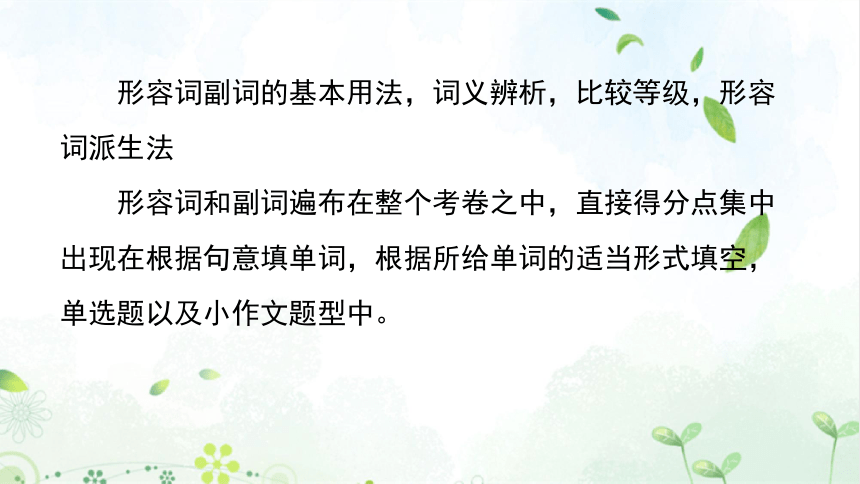
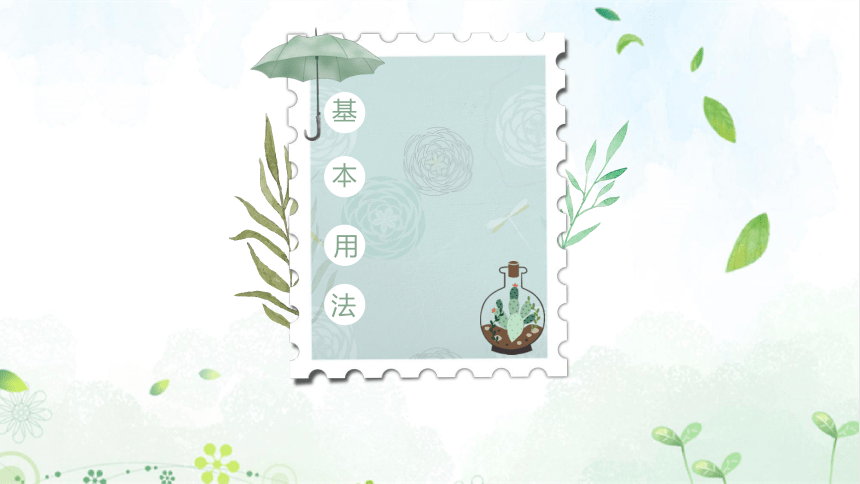


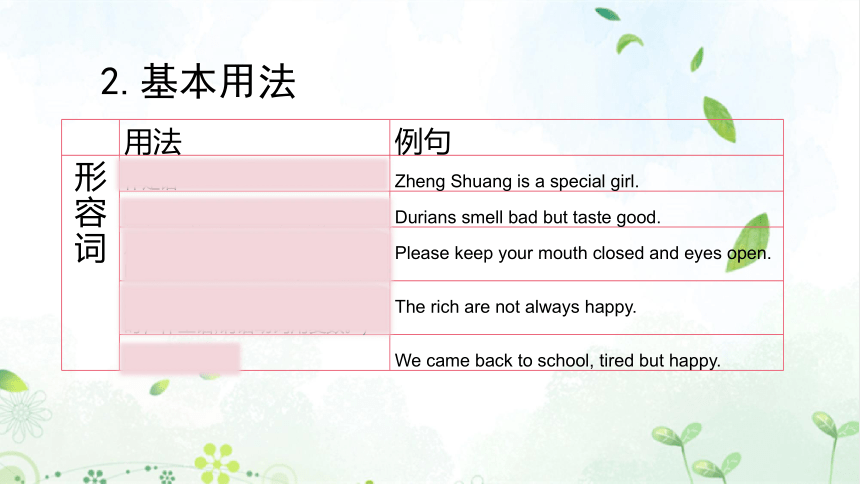
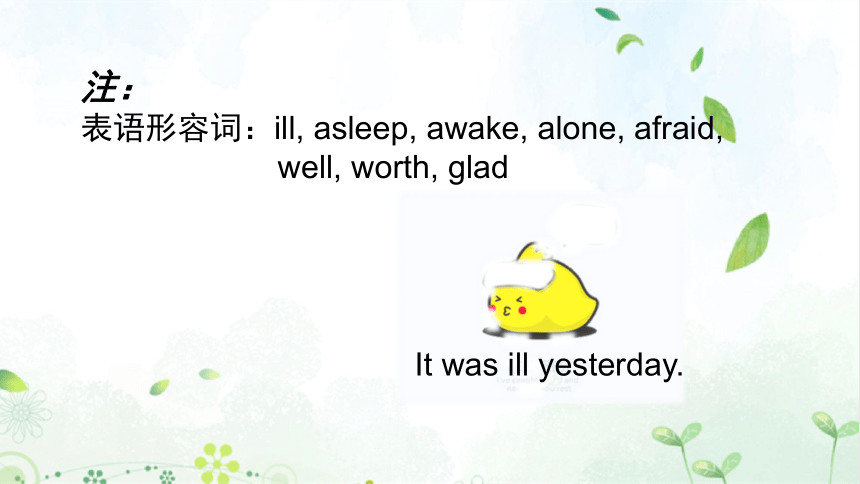
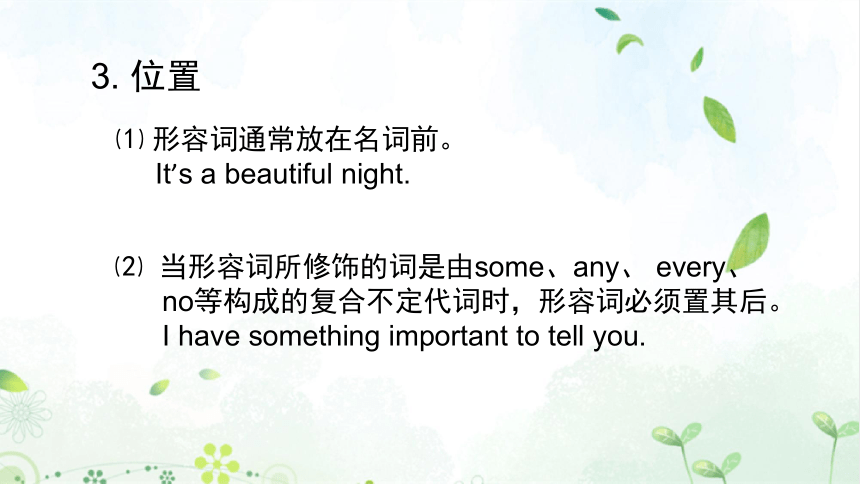
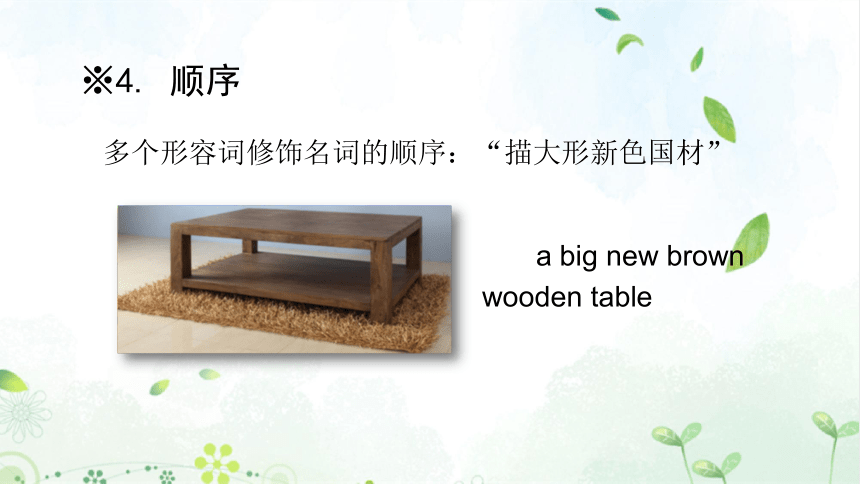
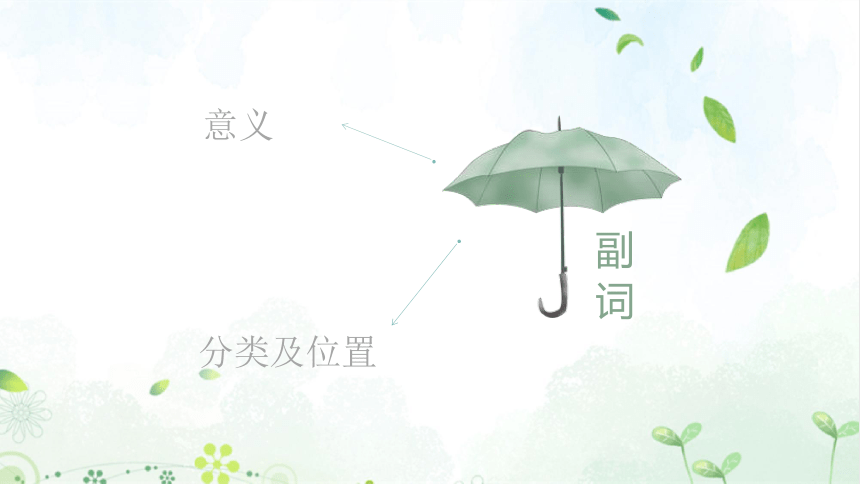
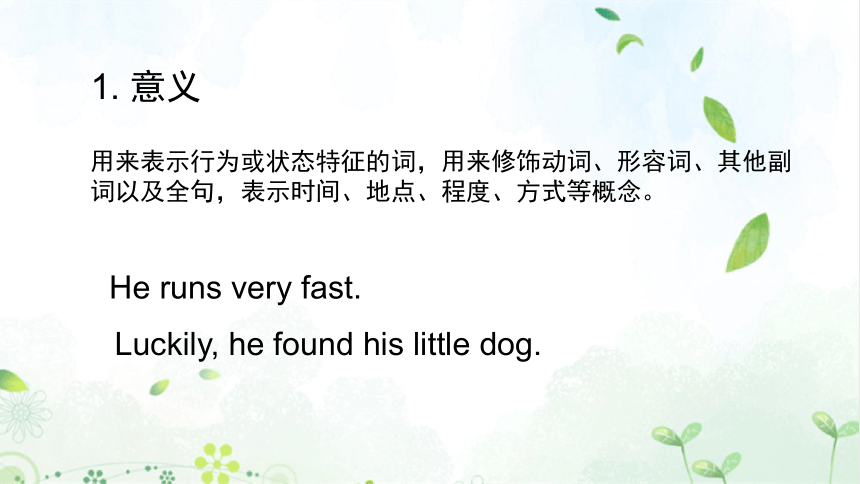
文档简介
(共64张PPT)
形容词副词
中考专项复习
形容词副词的基本用法,词义辨析,比较等级,形容词派生法
形容词和副词遍布在整个考卷之中,直接得分点集中出现在根据句意填单词,根据所给单词的适当形式填空,单选题以及小作文题型中。
基
本
用
法
意义
位置
顺序
基本用法
形容词
1.意义
用来表示人或事物的性质、特征或状态的词称为形容词。
e.g. What beautiful flowers they are!
2.基本用法
用法
例句
形 容 词 作定语
Zheng Shuang is a special girl.
作表语(位于系动词之后)
Durians smell bad but taste good.
作宾语补足语(常与make, keep, leave, find等动词连用)
Please keep your mouth closed and eyes open.
作主语(“the+形容词”表示一类人时,作主语,谓语动词用复数。)
The rich are not always happy.
作主语补足语
We came back to school, tired but happy.
注:
表语形容词:ill, asleep, awake, alone, afraid,
well, worth, glad
It was ill yesterday.
3. 位置
⑴ 形容词通常放在名词前。
It’s a beautiful night.
⑵ 当形容词所修饰的词是由some、any、 every、
no等构成的复合不定代词时,形容词必须置其后。
I have something important to tell you.
多个形容词修饰名词的顺序:“描大形新色国材”
※4. 顺序
a big new brown wooden table
分类及位置
意义
副 词
1. 意义
用来表示行为或状态特征的词,用来修饰动词、形容词、其他副词以及全句,表示时间、地点、程度、方式等概念。
He runs very fast.
Luckily, he found his little dog.
2. 分类及位置
分类 常见副词 副词位置 示例
时间副词 today, soon, yesterday, already 一般放在句子中动词的后面
It rained yesterday.
地点副词 here, there, away, home
Let’s go home.
Lucy does well at school.
方式副词 fast, slowly, well
程度副词 very, nearly, so, enough 一般放在所修饰的形容词或副词的前面
I’m very tired.
频度副词 always, never, often, seldom, hardly, usually, sometimes 位置:“系后实前” ,有时为了加强语气,也可以将其放在句首(用倒装)。
He often plays chess.
形
派
生
法
⑴ 形容词+ ly →副词
quick → ______; happy → ______; wide → ______
1. 后缀
safety
warmth
happiness
foreigner
quickly
happily
widely
⑵ 形容词+ ness / er / th / ty →名词
happy → ________; foreign → _________;
warm → ________; safe → ________
否定前缀:im / in / dis / un
polite → __________;
expensive → ___________;
honest → _________;
comfortable → ___________
2.前缀
impolite
inexpensive
dishonest
uncomfortable
根据句意及汉语提示完成句子
1.When they _________(最终) arrived at the hotel, it was midnight.
2.Zhang Jing is thought highly of because of her _________ (完美的) translation.
3.In order to see the blackboard _________ (清楚地), she must wear glasses every day.
4.My grandpa’s money was _________(安全地) locked in the drawer.
5.You must be _________(小心的) when a stranger asks about your personal information.
6.There is nothing _________(奇怪的) in the box.
finally
perfect
clearly
safely
careful
strange
7.All Chinese people think _________ (高度地) of Zhong Nanshan because of his achievements.
8.To help my parents live a better life is ________ (确切地) what I want.
9.The boy entered the room _________ (悄悄地) in order not to wake up his mother.
10.I’m_________ (口渴的), and I want something to drink.
11.She is_________ (自豪的) that her daughter has so much talent.
12.Alice is a clever girl. She is always_________ (有能力的) to come up with good ideas.
13.It was midnight, but he was still _________ (清醒) thinking about the teaching plan.
14.When the office had a power cut _________ (突然), everyone screamed.
highly
exactly
quietly
thirsty
proud
able
awake
suddenly
比
较
等
级
肯定形式:as+形容词/副词原级+as
否定形式:not as / so +形容词/副词原级+as
⑴ 句型
1. 原级
Science is as important as math.
He didn’t clean the room as carefully as me.
“和……一样”
“不如……”
very/too/so/quite+形容词/副词原级
⑵ 修饰语
I’m so
happy to
see my
idol.
2. 比较级及最高级
⑴ 形容词、副词比较等级的构成
原级 比较级 最高级
单音节词和部分双音节 一般在词尾加er / est tall short taller shorter tallest
shortest
以不发音字母e结尾的,在词尾加r或st nice late nicer later nicest
latest
重读闭音节词尾只有一个辅音字母时,双写该辅音字母,再加er / est big thin fat bigger thinner fatter biggest
thinnest
fattest
以“辅音字母+y” 结尾的变y为i,再加er / est early funny earlier funnier earliest
funniest
部分双音节词和多音节词 在词前加more / most interesting beautiful more interesting more beautiful most interesting
most beautiful
原级 比较级
最高级
many/much more
most
good/well better
beat
bad/badly/ill worse
worst
little less
least
far farther/further
farthest/furthest
old older/elder
older/elder
① 比较级+than ...
e.g. This tree is taller than that one.
② Which / Who is +比较级,A or B
e.g. Which subject do you like better, Chinese or math
⑵ 形容词、副词比较级的基本句型
③ “The +比较级(+主+谓+其他),the +比较级(+
主+谓+其他)” 表示“越......,就越......”
The more you eat,
the heavier you’ll be.
④“……比较级+and+比较级...... ”
表示“越来越……”
(多音节词:more and more+原级)
In winter, the days are getting colder and colder.
Our world is becoming more and more beautiful.
⑤ “the+比较级+of the two... ”
表示“两者之中较/更......”
Lu Han is the stronger of the two boys.
⑥ ... than any other +可数名词单数
He is taller than any other student in his class.
※⑦ 表示倍数:
数字+ times+比较级+than ...
= (数字+1)+times as+原级+as
Our room is twice larger than theirs.
Our room is three times as large as theirs.
比较级前可用much、 a little、 a lot、 a bit、 even等修饰。
⑶ 比较级的修饰语
Zhao is much more famous than me.
You study much harder than me.
He is the tallest of us.
in my class.
⑷形容词、副词最高级的基本句型
① ... the+最高级+
of +比较对象
in+范围
② ... one of the +最高级+n.pl.
The Great Wall is one of the greatest wonders in the world.
③ … the+序数词+最高级
Sam is the second youngest in my class.
④ Which / Who is the+最高级,A,B or C
Who is the thinnest, Linda, Lily or Grace
1.—What’s ______ mountain in the world
—Qomolangma. It is 8848.86 meters high according to the latest report.
A.higher B.highest C.the highest D.high
2.Bill lives _______ to school than Peter.
A.close B.closed C.closer D.the closest
3.Protecting ourselves is one of _____ things we must do.
A.important B.more important C.most important D.the most important
4.—Who is the girl dancing on the stage
—Oh, she’s my friend Maria. She dances _______ than before.
A.well B.much better C.best D.the best
C
玩转考点
C
B
D
5.I think ______ children learn to look after themselves, ______ it is for their future.
A.the earlier;the better B.the earliest;the best
C.the early;the good
6.The roads are becoming _______ as more people go to work in the morning.
A.wider B.longer C.cleaner D.busier
7.The more _______ you drive, the ________ you are.
A.careful;safer B.carefully;safer
C.carefully;safely D.careful;safely
A
D
B
8.—Is your father strict with you
—Yes.He takes my grades as ______ as my teachers do.
A.serious B.more serious C.seriously D.more seriously
9.—Are you going to the airport by bus
—I’d rather take a taxi. It’s ______.
A.quicker B.cheaper C.the quickest D.the cheapest
10.Peter studies ______ of all the students in his class.
A.hard B.harder C.hardest
C
A
C
形
副
辨
析
-ing & -ed
-ing adj. 修饰物,在句中做定语 或表语。
The story is interesting.
-ed adj. 修饰人,只能做表语。
Linda is interested in reading.
exciting & excited
relaxing& relaxed
boring & bored
alone & lonely
He dances alone, but he doesn’t feel lonely.
alone adj. & adv. 意为“独自地,单 独地”,指无人陪 伴,只能作表语, 无感彩。 (做副词时, alone 可作状语)。
He dances alone but he doesn’t feel lonely.
lonely adj. 意为“孤独的,寂寞的", 含有感彩,可作定 语和表语。
She is a lonely person. You can’t get on well with her easily.
alive, live,
living, lively
alive adj. “活着的,在世的”,一般指人,多作表语。
I’m still alive.
live adj. 主要用于修饰动物或无生命的动词,作前 置定语。另外还有“现场直播的”意思。
He said he had seen a live whale.
I want to see the live show.
living adj. 既可以作表语又可以作定语,可以修饰人 和物或比喻场合。意为“活着的”,强调说 明“健在的”。
The living should remember the old days.
lively adj. 在句中作表语或定语,意为“活泼的,生动的,栩栩如生的”, 既可以指人,又可以指物。
She is a lively girl.
sick & ill
sick adj. “生病的“,作定语和 表语
It is a sick dog.
ill adj. “生病的”,只能作表 语
Tom has been ill/sick for a long time.
sleepy, asleep,
sleeping
sleepy adj. “困倦的”,可作表语和定 语
I felt sleepy all day.
asleep adj. “睡着的”,只作表语
fall asleep “入睡”,强调动作;
be asleep “睡着的”,强调状态
sleeping adj. “正在睡觉的”,既可作表 语,又可作定语,强调 状态
a sleeping beauty
sleepy-asleep-sleeping
so & such
so
such
adv.
adj.
so + adj. / adv. (+ a / an + n.)
such + a / an + adj. + n.
such + adj. +n.pl.
such + adj. +u.n.
He is so great a boy.
He is such a great boy.
We have so much homework to do.
There are so many people on the beach.
loud, aloud, loudly
loud adj. & adv. 大声地,高声地,响亮 地
Speak louder, or no one will hear you.
aloud adv. 出声地,使声音能听到
Read aloud, please!
loudly adv. 高声地,含有“吵闹地,嘈杂 地”之意
Suddenly the bell on the wall rang loudly.
especially &
specially
especially adv.强调事物特有的性质、性 格或专门的目的、用途。
I love England, especially in autumn.
specially adv. 强调的是重要性,有优越、 好感之意。
He came here specially to say sorry to her.
hard & hardly
hard adj. 硬的;难的 adv. 努力地;猛烈地
The stone is hard.
It rained hard / heavily.
hardly adv. 几乎不
I can hardly understand my teacher’s words.
too, also,
either
too adv. 肯定句句末
—I like bananas.
—I like bananas, too.
also adv. 肯定句句中
She also knows the result.
either adv. 否定句句末
—Jim didn’t go to Beijing.
—Bill didn’t, either.
Ⅰ.单项选择。
1.Drinking tea is usually seen as a ______ life style in China.
A.strict B.boring C.clean D.healthy
2.—The Chinese language is more and more popular.
—Exactly! It’s becoming a ______ language skill in the international community.
A.similar B.difficult
C.necessary D.traditional
3.It’s not ______ to talk with your mouth full.
A.boring B.polite C.terrible D.sleepy
D
B
玩转考点
C
4.—Does the store have good fame
—Yes, the prices here are always very fair. The owner just wants to make a (an)_______ living.
A.honest B.healthy C.relaxing D.exciting
5.No one is ______. The key is to learn from mistakes and never stop.
A.careful B.generous C.famous D.perfect
6.I can’t believe you made the life-like cat out of paper. How ______ you are!
A.loyal B.creative C.helpful D.organized
D
A
B
7.—I think it is a good way to study English by watching English movies.
—I agree. I find it ______ to improve my listening.
A.harmful B.thankful C.careful D.helpful
8.Peter has a ______ memory and often forgets the names of people around him.
A.long B.good C.rich D.poor
9.We should learn to decide what is right and what is ______ facing rumors (谣言).
A.easy B.difficult C.wrong D.high
D
D
C
10.In order to send the donations to the hospital as soon as possible, the drivers ______ stopped to eat or rest during the journey.
A.nearly B.hardly C.badly D.mostly
11.Susan went into her bedroom and ate chocolate ______, not letting her parents know that.
A.slowly B.calmly C.secretly D.properly
12.Sue works ______, so she never seems to make mistakes.
A.late B.alone C.happily D.carefully
B
C
D
13. Cloth shoes became popular during the Ming Dynasty, ______ in Sichuan province.
A.hardly B.nearly C.really D.especially
14. Please be polite and ______ offer your seat to people who need it.
A.never B.seldom C.sometimes D.always
15. Have you seen my mobile phone, Sam I can’t find it ______.
A.everywhere B.somewhere C.nowhere D.anywhere
16. —Does your sister spend her money ______
—Yes, of course. She knows what to buy and what not to buy.
A.quickly B.wisely C.badly D.simply
D
D
D
B
17. You and I are lucky as we’ve ______ had to worry about finding clean water.
A.often B.usually C.never
18. —What time is it now
—I can’t tell you the time ______, but I know it’s too late.
A.exactly B.suddenly C.politely D.wisely
19. Zhong Nanshan is ______ thought to be the hero of fighting against COVID-19.
A.hardly B.widely C.suddenly D.badly
20. —I think Miss Wang is the most _______ teacher in our school.
—That’s true. She never gets angry with her students.
A.patient B.beautiful
C.interesting D.important
C
A
B
A
Ⅱ. 完形填空。
Most children simply go to the store and buy birthday cards for their fathers. But Tina didn’t. She spent much time cutting pictures and making a
1 birthday card for her father. Then, she wrote a message to him. It said, “Happy birthday to the best father in the world. You work really hard and always think of Mom and me. We both love you.”
When everything was 2 .Tina sat down quietly and waited for her father to get home. As Mr. Fisher opened the door, Tina jumped up quickly to sing the song Happy birthday. Mr. Fisher didn’t expect them to remember his birthday, so he was very 3 .
When Mrs. Fisher lit the candles, Mr. Fisher made a wish. Then, he blew out all the candles. He looked around at his family. The birthday card from his daughter was 4 than any gift from the store. He was moved to tears and he knew that he was very 5 to have a family like this.
( )1. A.special B.expensive C.common D.cheap
( )2. A.busy B.ready C.nice D.free
( )3. A.upset B.bored C.sad D.surprised
( )4. A.easier B.worse C.better D.harder
( )5. A.lucky B.quiet C.smart D.kind
A
D
C
A
B
形容词短语
1.与about搭配
be careful about(对……小心)
be certain/sure about(对……有把握)
be crazy about(对……热衷)
be sorry about(对……感到抱歉)
be worried about(对……担忧)
2.与at搭配
be angry at(对……生气)
be clever at(在……方面熟练)
be good at(擅长于)
be mad at(对……愤怒)
be surprised at(对……感到惊奇)
3.与for搭配
be bad for(对……有坏处)
be famous/known/well-known for(因……而著名)
be good for(对……有好处)
be late for(迟到)
be sorry for(为……感到抱歉)
be thirsty for(渴望)
be/get ready for(为……做好准备)
4.与from搭配
be absent from(缺席)
be different from(与……不同)
5.与in搭配
be disappointed in(对……失望)
be interested in(对……感兴趣)
be successful in(在……方面成功)
be weak in(在……方面薄弱)
6.与of搭配
be afraid of(害怕)
be certain/sure of(对……有把握)
be fond of(喜欢)
be full of(充满)
be proud of(对……感到自豪)
be short of(短缺)
be/get tired of(对……感到厌倦)
7.与to搭配
be close to(接近,靠近)
be friendly to(对……友好)
be good to(对……好)
be kind to(对……和蔼)
be nice to(对……友好)
be polite to(对……礼貌)
be rude to(对……粗鲁)
be similar to(与……相似)
be thankful to(对……心存感激)
be useful to(对……有用)
8.与with搭配
be angry with(对……生气)
be busy with(忙于)
be careful with(小心)
be filled with(充满)
be happy/pleased/satisfied with(对……感到满意)
be patient with(对……有耐心)
be strict with(对……严格要求)
形容词副词
中考专项复习
形容词副词的基本用法,词义辨析,比较等级,形容词派生法
形容词和副词遍布在整个考卷之中,直接得分点集中出现在根据句意填单词,根据所给单词的适当形式填空,单选题以及小作文题型中。
基
本
用
法
意义
位置
顺序
基本用法
形容词
1.意义
用来表示人或事物的性质、特征或状态的词称为形容词。
e.g. What beautiful flowers they are!
2.基本用法
用法
例句
形 容 词 作定语
Zheng Shuang is a special girl.
作表语(位于系动词之后)
Durians smell bad but taste good.
作宾语补足语(常与make, keep, leave, find等动词连用)
Please keep your mouth closed and eyes open.
作主语(“the+形容词”表示一类人时,作主语,谓语动词用复数。)
The rich are not always happy.
作主语补足语
We came back to school, tired but happy.
注:
表语形容词:ill, asleep, awake, alone, afraid,
well, worth, glad
It was ill yesterday.
3. 位置
⑴ 形容词通常放在名词前。
It’s a beautiful night.
⑵ 当形容词所修饰的词是由some、any、 every、
no等构成的复合不定代词时,形容词必须置其后。
I have something important to tell you.
多个形容词修饰名词的顺序:“描大形新色国材”
※4. 顺序
a big new brown wooden table
分类及位置
意义
副 词
1. 意义
用来表示行为或状态特征的词,用来修饰动词、形容词、其他副词以及全句,表示时间、地点、程度、方式等概念。
He runs very fast.
Luckily, he found his little dog.
2. 分类及位置
分类 常见副词 副词位置 示例
时间副词 today, soon, yesterday, already 一般放在句子中动词的后面
It rained yesterday.
地点副词 here, there, away, home
Let’s go home.
Lucy does well at school.
方式副词 fast, slowly, well
程度副词 very, nearly, so, enough 一般放在所修饰的形容词或副词的前面
I’m very tired.
频度副词 always, never, often, seldom, hardly, usually, sometimes 位置:“系后实前” ,有时为了加强语气,也可以将其放在句首(用倒装)。
He often plays chess.
形
派
生
法
⑴ 形容词+ ly →副词
quick → ______; happy → ______; wide → ______
1. 后缀
safety
warmth
happiness
foreigner
quickly
happily
widely
⑵ 形容词+ ness / er / th / ty →名词
happy → ________; foreign → _________;
warm → ________; safe → ________
否定前缀:im / in / dis / un
polite → __________;
expensive → ___________;
honest → _________;
comfortable → ___________
2.前缀
impolite
inexpensive
dishonest
uncomfortable
根据句意及汉语提示完成句子
1.When they _________(最终) arrived at the hotel, it was midnight.
2.Zhang Jing is thought highly of because of her _________ (完美的) translation.
3.In order to see the blackboard _________ (清楚地), she must wear glasses every day.
4.My grandpa’s money was _________(安全地) locked in the drawer.
5.You must be _________(小心的) when a stranger asks about your personal information.
6.There is nothing _________(奇怪的) in the box.
finally
perfect
clearly
safely
careful
strange
7.All Chinese people think _________ (高度地) of Zhong Nanshan because of his achievements.
8.To help my parents live a better life is ________ (确切地) what I want.
9.The boy entered the room _________ (悄悄地) in order not to wake up his mother.
10.I’m_________ (口渴的), and I want something to drink.
11.She is_________ (自豪的) that her daughter has so much talent.
12.Alice is a clever girl. She is always_________ (有能力的) to come up with good ideas.
13.It was midnight, but he was still _________ (清醒) thinking about the teaching plan.
14.When the office had a power cut _________ (突然), everyone screamed.
highly
exactly
quietly
thirsty
proud
able
awake
suddenly
比
较
等
级
肯定形式:as+形容词/副词原级+as
否定形式:not as / so +形容词/副词原级+as
⑴ 句型
1. 原级
Science is as important as math.
He didn’t clean the room as carefully as me.
“和……一样”
“不如……”
very/too/so/quite+形容词/副词原级
⑵ 修饰语
I’m so
happy to
see my
idol.
2. 比较级及最高级
⑴ 形容词、副词比较等级的构成
原级 比较级 最高级
单音节词和部分双音节 一般在词尾加er / est tall short taller shorter tallest
shortest
以不发音字母e结尾的,在词尾加r或st nice late nicer later nicest
latest
重读闭音节词尾只有一个辅音字母时,双写该辅音字母,再加er / est big thin fat bigger thinner fatter biggest
thinnest
fattest
以“辅音字母+y” 结尾的变y为i,再加er / est early funny earlier funnier earliest
funniest
部分双音节词和多音节词 在词前加more / most interesting beautiful more interesting more beautiful most interesting
most beautiful
原级 比较级
最高级
many/much more
most
good/well better
beat
bad/badly/ill worse
worst
little less
least
far farther/further
farthest/furthest
old older/elder
older/elder
① 比较级+than ...
e.g. This tree is taller than that one.
② Which / Who is +比较级,A or B
e.g. Which subject do you like better, Chinese or math
⑵ 形容词、副词比较级的基本句型
③ “The +比较级(+主+谓+其他),the +比较级(+
主+谓+其他)” 表示“越......,就越......”
The more you eat,
the heavier you’ll be.
④“……比较级+and+比较级...... ”
表示“越来越……”
(多音节词:more and more+原级)
In winter, the days are getting colder and colder.
Our world is becoming more and more beautiful.
⑤ “the+比较级+of the two... ”
表示“两者之中较/更......”
Lu Han is the stronger of the two boys.
⑥ ... than any other +可数名词单数
He is taller than any other student in his class.
※⑦ 表示倍数:
数字+ times+比较级+than ...
= (数字+1)+times as+原级+as
Our room is twice larger than theirs.
Our room is three times as large as theirs.
比较级前可用much、 a little、 a lot、 a bit、 even等修饰。
⑶ 比较级的修饰语
Zhao is much more famous than me.
You study much harder than me.
He is the tallest of us.
in my class.
⑷形容词、副词最高级的基本句型
① ... the+最高级+
of +比较对象
in+范围
② ... one of the +最高级+n.pl.
The Great Wall is one of the greatest wonders in the world.
③ … the+序数词+最高级
Sam is the second youngest in my class.
④ Which / Who is the+最高级,A,B or C
Who is the thinnest, Linda, Lily or Grace
1.—What’s ______ mountain in the world
—Qomolangma. It is 8848.86 meters high according to the latest report.
A.higher B.highest C.the highest D.high
2.Bill lives _______ to school than Peter.
A.close B.closed C.closer D.the closest
3.Protecting ourselves is one of _____ things we must do.
A.important B.more important C.most important D.the most important
4.—Who is the girl dancing on the stage
—Oh, she’s my friend Maria. She dances _______ than before.
A.well B.much better C.best D.the best
C
玩转考点
C
B
D
5.I think ______ children learn to look after themselves, ______ it is for their future.
A.the earlier;the better B.the earliest;the best
C.the early;the good
6.The roads are becoming _______ as more people go to work in the morning.
A.wider B.longer C.cleaner D.busier
7.The more _______ you drive, the ________ you are.
A.careful;safer B.carefully;safer
C.carefully;safely D.careful;safely
A
D
B
8.—Is your father strict with you
—Yes.He takes my grades as ______ as my teachers do.
A.serious B.more serious C.seriously D.more seriously
9.—Are you going to the airport by bus
—I’d rather take a taxi. It’s ______.
A.quicker B.cheaper C.the quickest D.the cheapest
10.Peter studies ______ of all the students in his class.
A.hard B.harder C.hardest
C
A
C
形
副
辨
析
-ing & -ed
-ing adj. 修饰物,在句中做定语 或表语。
The story is interesting.
-ed adj. 修饰人,只能做表语。
Linda is interested in reading.
exciting & excited
relaxing& relaxed
boring & bored
alone & lonely
He dances alone, but he doesn’t feel lonely.
alone adj. & adv. 意为“独自地,单 独地”,指无人陪 伴,只能作表语, 无感彩。 (做副词时, alone 可作状语)。
He dances alone but he doesn’t feel lonely.
lonely adj. 意为“孤独的,寂寞的", 含有感彩,可作定 语和表语。
She is a lonely person. You can’t get on well with her easily.
alive, live,
living, lively
alive adj. “活着的,在世的”,一般指人,多作表语。
I’m still alive.
live adj. 主要用于修饰动物或无生命的动词,作前 置定语。另外还有“现场直播的”意思。
He said he had seen a live whale.
I want to see the live show.
living adj. 既可以作表语又可以作定语,可以修饰人 和物或比喻场合。意为“活着的”,强调说 明“健在的”。
The living should remember the old days.
lively adj. 在句中作表语或定语,意为“活泼的,生动的,栩栩如生的”, 既可以指人,又可以指物。
She is a lively girl.
sick & ill
sick adj. “生病的“,作定语和 表语
It is a sick dog.
ill adj. “生病的”,只能作表 语
Tom has been ill/sick for a long time.
sleepy, asleep,
sleeping
sleepy adj. “困倦的”,可作表语和定 语
I felt sleepy all day.
asleep adj. “睡着的”,只作表语
fall asleep “入睡”,强调动作;
be asleep “睡着的”,强调状态
sleeping adj. “正在睡觉的”,既可作表 语,又可作定语,强调 状态
a sleeping beauty
sleepy-asleep-sleeping
so & such
so
such
adv.
adj.
so + adj. / adv. (+ a / an + n.)
such + a / an + adj. + n.
such + adj. +n.pl.
such + adj. +u.n.
He is so great a boy.
He is such a great boy.
We have so much homework to do.
There are so many people on the beach.
loud, aloud, loudly
loud adj. & adv. 大声地,高声地,响亮 地
Speak louder, or no one will hear you.
aloud adv. 出声地,使声音能听到
Read aloud, please!
loudly adv. 高声地,含有“吵闹地,嘈杂 地”之意
Suddenly the bell on the wall rang loudly.
especially &
specially
especially adv.强调事物特有的性质、性 格或专门的目的、用途。
I love England, especially in autumn.
specially adv. 强调的是重要性,有优越、 好感之意。
He came here specially to say sorry to her.
hard & hardly
hard adj. 硬的;难的 adv. 努力地;猛烈地
The stone is hard.
It rained hard / heavily.
hardly adv. 几乎不
I can hardly understand my teacher’s words.
too, also,
either
too adv. 肯定句句末
—I like bananas.
—I like bananas, too.
also adv. 肯定句句中
She also knows the result.
either adv. 否定句句末
—Jim didn’t go to Beijing.
—Bill didn’t, either.
Ⅰ.单项选择。
1.Drinking tea is usually seen as a ______ life style in China.
A.strict B.boring C.clean D.healthy
2.—The Chinese language is more and more popular.
—Exactly! It’s becoming a ______ language skill in the international community.
A.similar B.difficult
C.necessary D.traditional
3.It’s not ______ to talk with your mouth full.
A.boring B.polite C.terrible D.sleepy
D
B
玩转考点
C
4.—Does the store have good fame
—Yes, the prices here are always very fair. The owner just wants to make a (an)_______ living.
A.honest B.healthy C.relaxing D.exciting
5.No one is ______. The key is to learn from mistakes and never stop.
A.careful B.generous C.famous D.perfect
6.I can’t believe you made the life-like cat out of paper. How ______ you are!
A.loyal B.creative C.helpful D.organized
D
A
B
7.—I think it is a good way to study English by watching English movies.
—I agree. I find it ______ to improve my listening.
A.harmful B.thankful C.careful D.helpful
8.Peter has a ______ memory and often forgets the names of people around him.
A.long B.good C.rich D.poor
9.We should learn to decide what is right and what is ______ facing rumors (谣言).
A.easy B.difficult C.wrong D.high
D
D
C
10.In order to send the donations to the hospital as soon as possible, the drivers ______ stopped to eat or rest during the journey.
A.nearly B.hardly C.badly D.mostly
11.Susan went into her bedroom and ate chocolate ______, not letting her parents know that.
A.slowly B.calmly C.secretly D.properly
12.Sue works ______, so she never seems to make mistakes.
A.late B.alone C.happily D.carefully
B
C
D
13. Cloth shoes became popular during the Ming Dynasty, ______ in Sichuan province.
A.hardly B.nearly C.really D.especially
14. Please be polite and ______ offer your seat to people who need it.
A.never B.seldom C.sometimes D.always
15. Have you seen my mobile phone, Sam I can’t find it ______.
A.everywhere B.somewhere C.nowhere D.anywhere
16. —Does your sister spend her money ______
—Yes, of course. She knows what to buy and what not to buy.
A.quickly B.wisely C.badly D.simply
D
D
D
B
17. You and I are lucky as we’ve ______ had to worry about finding clean water.
A.often B.usually C.never
18. —What time is it now
—I can’t tell you the time ______, but I know it’s too late.
A.exactly B.suddenly C.politely D.wisely
19. Zhong Nanshan is ______ thought to be the hero of fighting against COVID-19.
A.hardly B.widely C.suddenly D.badly
20. —I think Miss Wang is the most _______ teacher in our school.
—That’s true. She never gets angry with her students.
A.patient B.beautiful
C.interesting D.important
C
A
B
A
Ⅱ. 完形填空。
Most children simply go to the store and buy birthday cards for their fathers. But Tina didn’t. She spent much time cutting pictures and making a
1 birthday card for her father. Then, she wrote a message to him. It said, “Happy birthday to the best father in the world. You work really hard and always think of Mom and me. We both love you.”
When everything was 2 .Tina sat down quietly and waited for her father to get home. As Mr. Fisher opened the door, Tina jumped up quickly to sing the song Happy birthday. Mr. Fisher didn’t expect them to remember his birthday, so he was very 3 .
When Mrs. Fisher lit the candles, Mr. Fisher made a wish. Then, he blew out all the candles. He looked around at his family. The birthday card from his daughter was 4 than any gift from the store. He was moved to tears and he knew that he was very 5 to have a family like this.
( )1. A.special B.expensive C.common D.cheap
( )2. A.busy B.ready C.nice D.free
( )3. A.upset B.bored C.sad D.surprised
( )4. A.easier B.worse C.better D.harder
( )5. A.lucky B.quiet C.smart D.kind
A
D
C
A
B
形容词短语
1.与about搭配
be careful about(对……小心)
be certain/sure about(对……有把握)
be crazy about(对……热衷)
be sorry about(对……感到抱歉)
be worried about(对……担忧)
2.与at搭配
be angry at(对……生气)
be clever at(在……方面熟练)
be good at(擅长于)
be mad at(对……愤怒)
be surprised at(对……感到惊奇)
3.与for搭配
be bad for(对……有坏处)
be famous/known/well-known for(因……而著名)
be good for(对……有好处)
be late for(迟到)
be sorry for(为……感到抱歉)
be thirsty for(渴望)
be/get ready for(为……做好准备)
4.与from搭配
be absent from(缺席)
be different from(与……不同)
5.与in搭配
be disappointed in(对……失望)
be interested in(对……感兴趣)
be successful in(在……方面成功)
be weak in(在……方面薄弱)
6.与of搭配
be afraid of(害怕)
be certain/sure of(对……有把握)
be fond of(喜欢)
be full of(充满)
be proud of(对……感到自豪)
be short of(短缺)
be/get tired of(对……感到厌倦)
7.与to搭配
be close to(接近,靠近)
be friendly to(对……友好)
be good to(对……好)
be kind to(对……和蔼)
be nice to(对……友好)
be polite to(对……礼貌)
be rude to(对……粗鲁)
be similar to(与……相似)
be thankful to(对……心存感激)
be useful to(对……有用)
8.与with搭配
be angry with(对……生气)
be busy with(忙于)
be careful with(小心)
be filled with(充满)
be happy/pleased/satisfied with(对……感到满意)
be patient with(对……有耐心)
be strict with(对……严格要求)
同课章节目录
- 词法
- 名词
- 动词和动词短语
- 动词语态
- 动词时态
- 助动词和情态动词
- 非谓语动词
- 冠词
- 代词
- 数词和量词
- 形容词副词及其比较等级
- 介词和介词短语
- 连词和感叹词
- 构词法
- 相似、相近词比较
- 句法
- 陈述句
- 一般疑问句和否定疑问句
- 特殊疑问句及选择疑问句
- 反意疑问句
- 存在句(There be句型)
- 宾语从句
- 定语从句
- 状语从句
- 主谓一致问题
- 简单句
- 并列句
- 复合句
- 主谓一致
- 主、表语从句
- 名词性从句
- 直接引语和间接引语
- 虚拟语气
- 感叹句
- 强调句
- 倒装句
- 祈使句
- 句子的成分
- 句子的分类
- 题型专区
- 单项选择部分
- 易错题
- 完形填空
- 阅读理解
- 词汇练习
- 听说训练
- 句型转换
- 补全对话
- 短文改错
- 翻译
- 书面表达
- 任务型阅读
- 语法填空
- 其他资料
